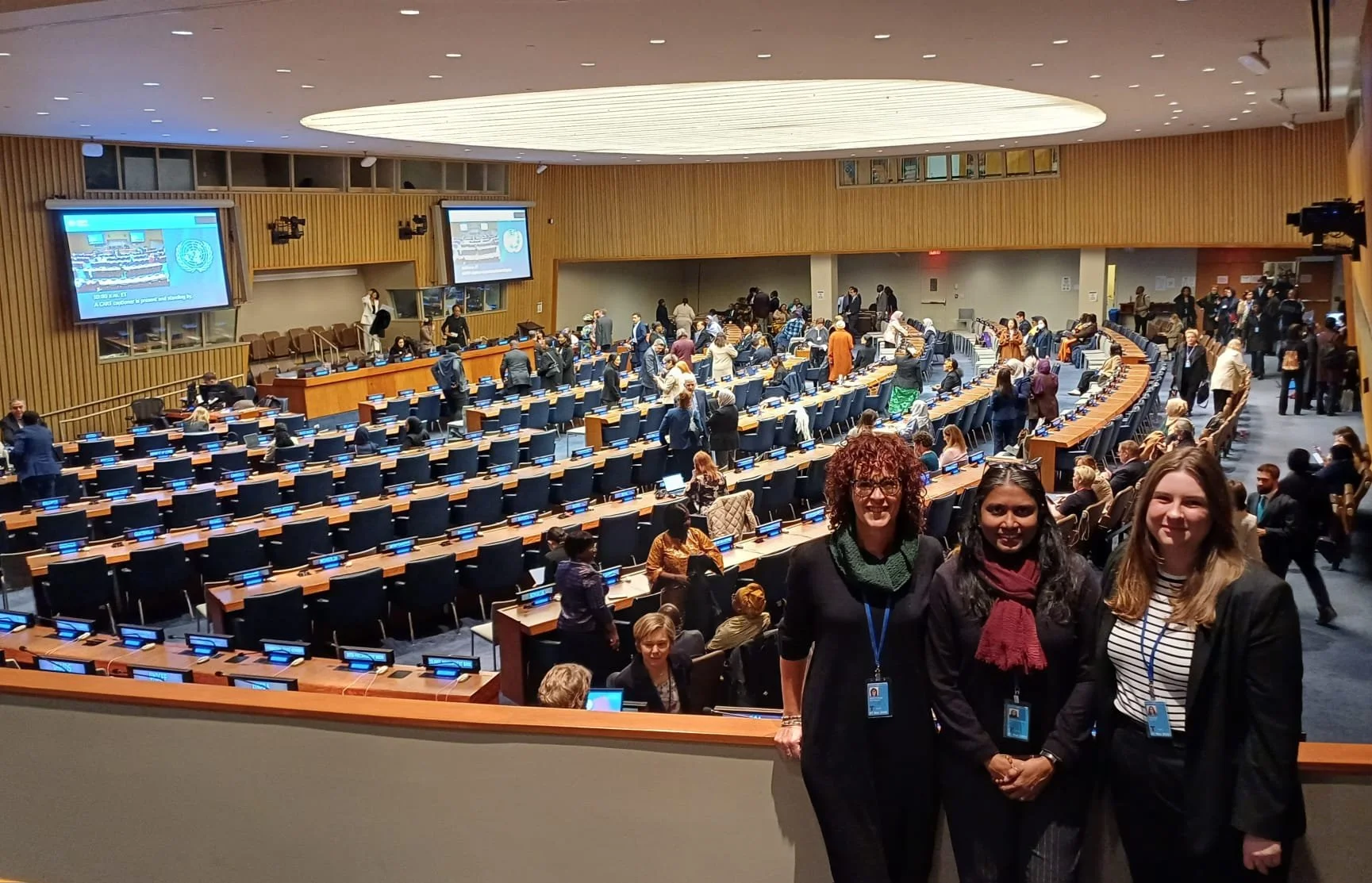The person who served you lunch may be a victim
Trafficking is everywhere—sometimes right in front of us. You can help.
Members of the World Freedom Network before their presentation at the UN Commission on the Status of Women. From left: Sarah Scott Webb (director, Oceania); Helen Avadiar-Nimbalker (director, Asia); Alexandra Sunberg (volunteer, global office).
Mitch Hamilton, a research consultant on diaspora and migration issues, thought something was odd.
Hamilton was attending a Christian conference at a European resort hotel that frequently hosts such events. Surprised by the number of Africans among the hotel staff, he did some quiet research and ascertained that their work conditions were less than ideal. In fact, they were in bondage to the agency that had recruited them.
The Africans had been enticed by offers of good pay and a good life. But once they arrived in Europe, the recruiting agency confiscated their passport and imposed various fees that ate up much of the Africans’ income.
The hotel was not directly involved in the exploitation but likely had some awareness of the Africans’ plight, since it knew they were working long hours with few days off. Hamilton saw an opportunity to involve hotel management as part of the solution, especially because a recent news article on forced labor trafficking in the region already had the hotel on the defensive.
“This hotel is doing damage control now because they don’t want to lose their Christian business,” Hamilton said. “They have a chance to redeem themselves and we can support them.”
Hamilton is working with a local pastor to plant a church for the African workers and to enable them to regain control of their lives. I hope to revisit this story with a positive update in the next few months.
From the sex trade in Thailand and people kidnapped into cyber-scamming in Myanmar to forced labor in tourist centers, human trafficking is one of the world’s most widespread injustices. The World Freedom Network (WFN) has connected hundreds of concerned organizations to fight trafficking globally, expanding the previous work of the European Freedom Network to six regions of the world.
Jennifer Tunehag, WFN’s global director, explained that the network has three main goals: to strengthen collaboration around the task of opposing trafficking, to engage the church, and to advocate for change. On March 13, WFN delivered a presentation to 50 representatives of concerned non-governmental organizations in conjunction with meetings of the United Nations Commission on the Status of Women in New York. As a result of that presentation, Tunehag stated, leaders of Baptist and Episcopal organizations that had not known about WFN expressed eagerness to collaborate.
For Tunehag, increasing the identification of trafficking victims is a major issue. “Conservative estimates say 27 million people are trafficked and exploited globally, but only 120,000 of them are identified each year,” she said.
Tunehag explained that many governments try to turn a blind eye to the problem, because acknowledging it would create a legal obligation to conduct investigations and provide public assistance to the victims. She said a single researcher contacted more trafficking victims on the streets of a major Majority World city in one weekend than the government admits exist in the whole country.
Even Singapore, a country with a very clean reputation, doesn’t have legislation consistent with international standards, Tunehag said, allowing human trafficking to continue out of public view.
Preparing for the UN presentation helped Tunehag recognize the need for better awareness-raising efforts. “We were offered the chance to put articles into an app for people to read before the presentation,” Tunehag noted. “But we found very few articles that would capture people’s imagination and show them what an NGO can do.”
If you’re wondering whether a few voices can make a difference, Tunehag has an unhappy form of proof for you.
“In some countries,” she pointed out, “the only people talking to legislators are sex workers, lobbying for good conditions so they can continue their sex work. Legislators listen to them because these are voices of people inside the industry, even though they’re a tiny number of people compared to the thousands of victims of sex trafficking. And then the politicians will tell us, ‘We’ve already heard about this,’ when they’ve heard from five sex workers. Until the victims are identified, they have no idea of the size or nature of the problem.”
I asked Tunehag how she’d like to see Christians equipped to participate in the battle against trafficking on a daily basis. “Some industries are known for exploitation: hospitality and tourism, agriculture, manufacturing and domestic work,” she said. “But vulnerable people could be on your church doorstep! Food pantries, youth programs, and refugee outreaches all provide excellent opportunities for the church to extend layers of care and protection to people at risk. Everyone can take these two steps: (1) learn who is vulnerable in your community, and what types of exploitation exist there; (2) learn how to identify red flags and how to refer suspected exploitation to local professionals who can provide help.”
Please visit the World Freedom Network’s extensive website and consider making contact with someone in your part of the world, or at least becoming informed so that you’ll notice, as Mitch Hamilton did, when something is not quite right.
Another expert view
My friend Sues Hess is executive director of Reclaiming Hope, a US nonprofit that assists survivors of sex trafficking. I invited her comments to complement this article:
Within the US, we work with different dynamics than most people think. Over 60 percent of those caught in sex trafficking are recruited and often controlled by their own inner circle—their families and significant others. Meanwhile, the internet is changing how youth are recruited.
In US churches, at least 1 in 6 people are addicted to porn. This is the source for buyers who want to realize their fantasies. So asking people to be accountable for their online experiences can help to stop the demand for sex trafficking.
